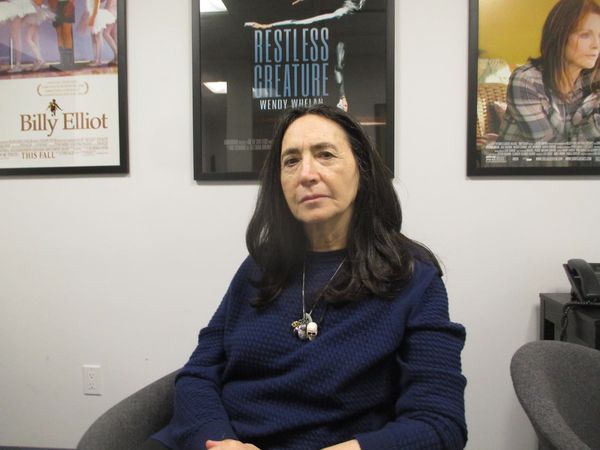Petra Epperlein and Michael Tucker’s kaleidoscopic investigation into the past and our future takes us on the road of history and the state of the world at this moment in time, featuring interviews with Saul Friedländer and Francine Prose on Leni Riefenstahl’s Triumph Of The Will, Martin Amis on political tactics and characterology, Deborah Lipstadt, Beate Klarsfeld, Serge Klarsfeld, and 94-year-old Yehuda Bauer getting the last word. We enter with books by Timothy Snyder, Hannah Arendt, George Orwell, Klaus Theweleit, and the one by Sebastian Haffner that gives the film its name.
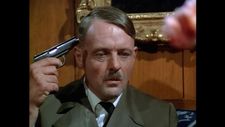 |
| Clips from Mel Brooks’s The Producers to Bruno Ganz in Oliver Hirschbiegel’s Downfall to Anthony Hopkins in George Schaefer’s The Bunker show “Hollywood’s love for Hitler” |
The Meaning Of Hitler (a DOC NYC highlight), executive produced by Marie Therese Guirgis (Julia Loktev’s The Loneliest Planet; Alexandria Bombach’s On Her Shoulders; Alison Klayman’s The Brink; Sam Pollard’s MLK/FBI; Alex Gibney, Ophelia Harutyunyan, Suzanne Hillinger Totally Under Control) Jeffrey Lurie, and Anthony Dobkin is an evermore timely critique on the danger of longing for a past that never existed in the first place. The great Claude Lanzmann comes to mind in various spots, when history is suddenly felt in locations that look utterly ordinary at first glance and where knowledge becomes our necessary guide.
On the first Friday the 13th following the US elections, The Meaning of Hitler directors Petra Epperlein and Michael Tucker joined me for a live e-mail exchange conversation.
Anne-Katrin Titze: Where are you at the moment?
Michael Tucker: We are both here (newly arrived in Berlin and in quarantine) and ready for you.
AKT: NYC is having a resurgence of COVID-19 cases. How are you coping in Berlin?
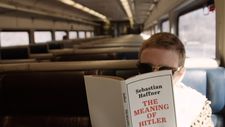 |
| Petra Epperlein: “This all started with those books and the anxiety of 2015-2016.” Photo: Michael Tucker |
MT: We just arrived from NY on Sunday [November 8]. While we are relieved and excited to be back in Germany, COVID is definitely on the rise here and Berlin may very well get hit hard this winter.
AKT: Let’s start with the ending. In an empty, COVID-ridden New York. A car is leaving the city. A drive on a dark road in America at night is the last shot. It ties back to the beginning, where we see you, Petra, riding on a commuter train into New York City in 2017, and then on to a subway - reading books (by Timothy Snyder, Hannah Arendt, George Orwell, Klaus Theweleit, and the one by Sebastian Haffner that gives the film its name). Books and thoughts and movement - were those the starting points of this project?
Petra Epperlein: This all started with those books and the anxiety of 2015-2016. We were shooting our last film in Germany just as PEGIDA and the AFD were rising up. And then there was BREXIT and the election of Trump. So, dystopian dread was everywhere.
MT: And of course, now, we live in a science-fiction movie of our worst nightmares.
 |
| Michael Tucker: “They bus these British school kids to these sites, but how are they supposed to truly understand what happened there?” Photo: Michael Tucker |
AKT: Martin Amis talks about how Hitler “resists understanding” and explains some of the tactics used: ”You undermine the institutions of the state because that magnifies your own position. Everything is dependent on you.” His novel Time’s Arrow is a fascinating take on revisiting history. Were you contemplating using a similar structure at any point in the process? The car rides shot through the windshield showing the Mercedes hood ornament made me think of that.
PE: From the beginning, when we decided to “adapt” the book [The Meaning of Hitler], the question was of how to have a dialogue between the past and the present without relying on archival. How do these events live in the landscape. As we went on the road - especially the East - it was stunning to see how little changed.
As for Amis, he’s quoting Haffner and the key idea about Hitler dismantling the state and ruling by chaos, which sounds very familiar.
AKT: One of the most chilling moments of the film, chilling because of its seeming banality, is your shot of the two boys on a school trip walking in the WWI trenches in Flanders, busy looking at their iPhones, completely removed not only from the past they are revisiting but also the very present of the time and place they are in. “You are here!” we want to shout at them. Then we hear a bang and startled they both look up. Great catch! Can you comment on this moment?
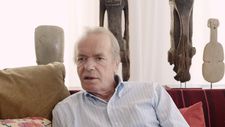 |
| Martin Amis in The Meaning Of Hitler: ”It wasn’t an ideology, it was more like characterology.” Photo: Michael Tucker |
MT: I loved that moment and I am so glad you noticed. It’s says so much about how meaningless certain aspects of memorial culture are. They bus these British school kids to these sites, but how are they supposed to truly understand what happened there? How can they? You can hear a young girl saying, “I wouldn’t be good at this”. That disconnect with the past - and context - is what worries so many historians. Life is pretty great in 2020, some might even say that it so good it is boring and that boredom may lead to all sorts of irrational responses.
AKT: I like very much how so many different “guided tours” found their way into your film, each one tying the images of the present to information or points of view about the past. I was reminded of Claude Lanzmann walking through the present of Theresienstadt in The Last Of The Unjust and how the spirit of place could be made palpable even on film. Did you also think of Lanzmann?
PE: Oh yes. We planned on seeing Lanzmann the summer he died. Saul Friedländer was close to him also. We even went as far to acquire Shoah outtakes from Sobibór, but then decided to not use. However, watching his process behind the scenes was fascinating. He clearly went a little mad while filming Shoah and after 4 years in this subject, it’s now apparent why. It consumes you. Martin Amis was keyed into that also.
 |
| Michael Tucker: “Sobibór is basically as it was when Lanzmann was there.” Photo: Michael Tucker |
AKT: Can you tell me a bit more about the Sobibór outtakes? What made you decide not to use them? The scenes with the archeologist [Wojciech Mazurek] in your film are very powerful.
MT: Sobibór is basically as it was when Lanzmann was there. Little has changed, except his Polish subjects are now probably all dead. The transcripts were fascinating - how his translator would sometimes not fully translate what the Poles were saying (often very crude antisemitic remarks). There is amazing footage of him driving up and down a cart path in Treblinka playing a piece of classical music (I think a death march) until he gets the scene right. We didn’t use the footage because we also cut out part of the film with Jan Gross that discusses the fact that at these sites people have long looked for treasure in the remains. We had Lanzmann footage where people talk about that.
AKT: The tour in Braunau, a 2015 immigration “hotspot”, revisits and debunks the “stable myth” and leads to Klaus Theweleit (so happy to see him included) who sums it up perfectly: “People are mostly afraid of strangers where there are very few strangers.” At the demonstration in Dresden, did someone threaten you? We hear an aggressive voice saying “lying pig” and ask which station you are from; the moment goes by very fast. Were there any moments when you did feel threatened?
 |
| Petra Epperlein: “Theweleit is an amazing thinker and more Americans should read him.” Photo: Michael Tucker |
PE: Theweleit is an amazing thinker and more Americans should read him. He basically has his finger on the pulse of what ails America.
MT: Yes, during those demos, people stalked, mocked and threatened us. There is great footage of Petra being stalked by right-wing thugs who are coughing into her microphone blimp. In the film, you can hear the chants of “lying press”. Kind of frightening and it’s getting worse in Germany. In fact, I would argue that the situation here is pretty dire - COVID deniers teamed up with very real Nazis.
AKT: "There is great footage of Petra being stalked ..." - what a way to put it! Was the impetus to show that frighteningly too many people now are falling into the trap of longing for a past that never existed in the first place? That the images continue to win over the facts?
MT: One thing that has happened in the last 4-6 years is that it is very dangerous to film these events even as accredited press. Many have been attacked in Germany. And there is hostility everywhere to the media.
 |
| Michael Tucker: “It is very dangerous to film these events even as accredited press.” Photo: Michael Tucker |
AKT: The lack of support and the rampant undermining of the media by the so-called unbiased media is frightening. The film clips chosen are perfectly placed, from Mel Brooks’s The Producers to Bruno Ganz in Oliver Hirschbiegel’s Downfall, to show what you call “Hollywood’s love for Hitler”, which leads to comments from Francine Prose and Saul Friedländer on Triumph of the Will. You ask the question of your own film’s responsibility of not feeding the fascination and in this context bring up the very strong point of “propaganda repackaged as reality.”
PE: This was an idea that was sparked by Saul Friedländer and the whole problem of representation. I mean, we must really love Hitler because there are literally thousands of films about him. And then there is the whole aesthetic argument of Sontag’s “fascinating fascism”. That, of course, was the Seventies, but the attraction and fascination persist. Saul was the one who really got us to understand the idea of those images being proposed but for the future. They were an imaginary reality. Not so different to the “greatness” people buy today. It’s all about the promise of a future. It’s not about now. It’s religious.
MT: The repackaging of propaganda is really problematic. These clips have been used over and over but what do they teach us? That Nazism looked good? And, mind you, most people are unaware that there is very little photo/film evidence of Hitler’s crimes (there isn’t any footage of the major extermination centre, just a handful of still images). What was not filmed did not exist. So, we are propagating their image of themselves.
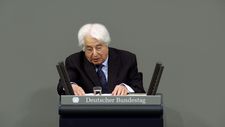 |
| Petra Epperlein on “propaganda repackaged as reality”: “This was an idea that was sparked by Saul Friedländer and the whole problem of representation.” Photo: Michael Tucker |
AKT: Speaking about images - in Munich we see a moustached cat on a poster titled Mein Kampf, advertising the George Tabori play of that name. Was the poster at the Braune Haus location? Did you see the play while you were in Munich? What a great coincidence to be able to include this startling visual detail.
MT: We didn’t see the play, but the poster was great and speaks to meme culture - Kitler - etc. The poster was near another museum in Munich.
AKT: Appropriately, Deborah Lipstadt gets the first word before you take us on a tour with the most despicable guide imaginable, David Irving. I was a bit confused by the woman identified as the official Polish state guide and her song at the Wolf’s Lair, intercut with Irving looking on. Did he take her tour and then venture out on his own? Did she accompany him on the same tour? In Treblinka, he is walking in the forest and along the tracks with his group, joking unashamedly until someone tells him “you still got your microphone on.”
PE: When Irving gave his tour there, he was joined by an official state tour guide. In Treblinka, he just roamed around free of any supervision. The Poles know he’s there, and many groups have tried to stop him.
 |
| Michael Tucker: “We didn’t see the play, but the poster was great and speaks to meme culture - Kitler - etc.” Photo: Michael Tucker |
AKT: Brilliant use of the clapboard to ground us in time and subject matter, sometimes in place. How did that come about?
PE: That actually came from two things: one was looking at US Army newsreels that often featured improvised claps using cans/cardboard etc that revealed a certain truth about location and the other thing was Lanzmann’s camera assistant in outtakes (pretty sure she is an established DP in France now). There is something really bothersome about documentary aesthetics - the staging required to achieve a “real” shot.
AKT: Lanzmann’s camera assistant - Light and the darkness - Caroline Champetier on Hannah Arendt, Margarethe von Trotta, Claude Lanzmann and the subject of evil.
MT: I don’t have the footage with me, but pretty sure that is her. A great film could be made of them shooting Shoah. It’s chilling.
AKT: One last question - The wonderful Yehuda Bauer gets the last word: “The Nazi ideas were acted out by people who were absolutely normal.” Hannah Arendt, of course, comes to mind again. Beate and Serge Klarsfeld are interviewed in Paris and he echoes what the guide early on in the bunker said, namely that “young people don’t understand war.” He also says that “history has no precise direction.” This thread is taken up by Saul Friedländer in the car in Berlin when he says that “memory moves in its own direction.” Was this also filmed on Holocaust Memorial Day in 2019, where he so eloquently and touchingly spoke at the Bundestag (in German, the language of his childhood)?
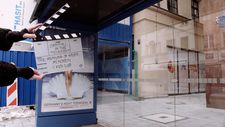 |
| The use of the clapboards in The Meaning Of Hitler grounds us in time and subject matter, sometimes in place. Photo: Michael Tucker |
MT: It was important to us that the locations be characters. Hitler- or potential Hitlerism - lives everywhere. That’s where Yehuda Bauer leaves us.
PE: We met Saul the week of his speech in Berlin, which was incredibly moving. His story is one of trauma and it really felt that he was coming full circle to speak in the Bundestag in the language of his childhood (and oppressor).
MT: The film is very much about the problem of history and how it’s weaponized. What’s the point of all of this history product if we haven’t learned anything? How do you explain Charlottesville? Or recent events in Germany and Poland? The world is clearly at a crossroads and we all have to make a choice as Yehuda Bauer states - it’s basic human empathy and cooperation vs. a cruel illiberal future.
AKT: Wishing the two of you the best during your quarantine. Stay safe and well.
MT/PE: This was great. When the dust settles, let’s get a drink. It was a pleasure chatting with someone who knows their stuff.
DOC NYC Live event: Monday, Nov. 16 at 2:00pm (EST) on Facebook Live – Francine Prose joins the head of Hannah Arendt Center Roger Berkowitz, Michael Tucker and Petra Epperlein for a conversation about Hitler’s legacy today.
The Meaning Of Hitler will screen virtually in the Metropolis competition at DOC NYC through Thursday, November 19.








